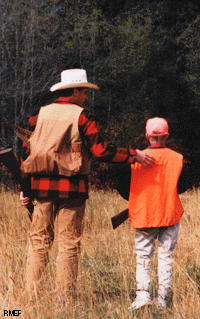|
OVERVIEW
HISTORY
ACTORS
MAPS
DIMENSIONS:
ecosystem
wildlife
economic
policy
recreation/aesthetic
social
STUDY
TEAM
REFERENCES
|
Elk- Human Social Interactions
in the Greater Yellowstone Ecosystem:

Wildlife watching: Elk in Yellowstone.
Elk are currently and have historically been
plentiful in the Greater Yellowstone Ecosystem. Elk have a social
following, which incorporates multiple faucets of human interest.
- Wildlife
watchers visiting Yellowstone encounter Rocky Mountain elk
more than any other wildlife species.
- Tourism
in Yellowstone has created economic gains, which aid in the development
of habitat protection and public education programs.
- Hunting
is a recreational sport in the Greater Yellowstone Ecosystem,
on BLM, private, USFS and National Reserve lands in Wyoming, Idaho
and Montana.

Hunting elk in the great outdoors!
Human interest groups have been developed which
reflect the different opportunities for social interaction with
elk.
- Four hunters founded the Rocky
Mountain Elk Foundation, and currently 90% of RMEF members
are hunters. This foundation is committed to maintaining elk
populations, and preserving elk habitat across the United States.
- Animal
Rights Activists', on the other hand, have formed multiple
groups, many of which oppose hunting. Other activists are opposed
to current management of elk on the National
Elk Refuge, in Jackson, Wyoming.

Animal Activists protesting human consumptive uses of animals
including: eating, wearing, shooting, etc.
Different people are interested in maintaining
different relationships with their environment, and more specifically,
with elk in Yellowstone. Interest groups are often at odds, where
their social objectives concerning treatment of elk differ.
|


